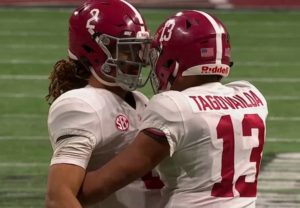In 2014, Pittsburgh Panther running back, James Conner, was on top of the world. At the conclusion of the season he was named the Atlantic Coast Conference (ACC) Offensive Player of the Year. James had his mind set on having an even better 2015 season that would position him to enter the NFL draft in the spring.
On the eighth play of the 2015 season Conner went down with a torn medial collateral ligament (MCL). While rehabbing the season ending injury, Conner was experiencing fatigue and other odd symptoms. After being encouraged by his family, coaches and friends Conner visited the doctor where he was diagnosed with Hodgkin’s lymphoma. Cancer.
Because of his high visibility, Conner was given the option to have a private room during his treatments. He chose not to, “Cancer don’t care if you are black or white. It comes and it comes hard. I’m no better than anyone else.”
Conner became an inspiration to hundreds and thousands of people going through treatment. Videos began to surface of him performing workouts with his teammates after his chemotherapy treatments. In 2016, he was awarded the “Disney Spirit Award” which is given to college football’s most inspirational individual or team.
James Conner was always driven. His drive allowed him to achieve incredible results on the gridiron. Following the ’14 season his focus was on developing into an elite NFL prospect. After his battle with cancer, Conner discovered his true why – “I play football for somebody who can’t.” Watch James Conner describe his “Why” (1:58)
The Story of My Why:
At the American Baseball Coaches Association in 2007, I listened as sports executive and motivational speaker, Pat Williams, discussed the importance of reading and life-long learning. He made a statement that if you read one book a week for 10 years you’ll have read over 5,000 books. I was already an avid reader but his words took me to another level. Reading was now a competitive advantage that I could use to make me a better coach. Unexpectedly, this led me to my why.
I am on the journey of discovering my best self. Equally as important, I want others to join me in this pursuit. For years, I believed success was an either/or type of thing. For example, you are either a successful coach OR a good husband and father. I now realize success and happiness are not mutually exclusive. Why can’t we be healthy, fit and happy at the same time that we are thriving at work? Why can’t we have a deep meaningful relationship with our spouse and still maintain strong connections with our friends?
For me, it starts at home. I want nothing more than for my wife and kids to find something that gets them fired up for their future. Next, it moves to the players and coaches in our baseball program. From there, it extends to the people I connect with via the newsletter and coaching seminars. Nothing fills me with joy more than seeing those I’m close with get on their path to greatness. It is easy to see when someone has found their sweet spot. It’s no longer work, they are on a mission to serve.
In my heart, I know that we are all put on this Earth to make a difference; to live a life of deep meaning. If we are bold enough to chase our dreams, we will be met with adversity and resistance along the way. When challenges arise, and they always do, we must be equipped with the tools to fight. Your why will push you, drag you, through those times. Without a why it is easier to give in and eventually give up.
I wish I could say it was easy, but it’s not. It’s critical to have a powerful why because the path is littered with obstacles. As we inch closer to our goals and dreams it becomes tougher and tougher. We need a guiding force, a strong and powerful why that keeps us moving forward. Without the why, it is easy to retreat and surrender to the pressure and sacrifice that accompanies high achievement.
Conclusion:
Following his battle with cancer, James Conner was drafted in third round of the 2017 NFL draft by the Pittsburgh Steelers. He is currently the top running back on the depth chart (disclaimer: top running back, Le’Veon Bell, is holding out in a contract dispute). He has gone against the odds and has become a professional football player. I wouldn’t bet against that young man, his why is too strong. Every time I see him carry the football I think, “He’s running for all those people who can’t!”
Think of a time you were really down or facing strong adversity. Ask yourself, deep down, why did I push through? Why didn’t I succumb to the fear? How did I find the strength to charge forward when everything was telling me to stop? That might just be where you find your why…
Make it a great week,
Mike
Watch this great Ted Talk on why business leaders need to start with the “WHY” (5:00)


